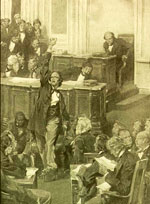Lincoln and Black Abolitionists
Manisha Sinha of the University of Massachusetts, Amherst, looks at the influence of black abolitionists on the policies and views of Abraham Lincoln, and the evolution of Lincoln's views on slavery and emancipation.
Manisha Sinha of the University of Massachusetts, Amherst, looks at the influence of black abolitionists on the policies and views of Abraham Lincoln, and the evolution of Lincoln's views on slavery and emancipation.
Reconstruction after the Civil War was America's first attempt at an interracial democracy. DeWitt Clinton Professor of History at Columbia University Eric Foner explains why an understanding of Reconstruction—and why it failed—is critical to understanding the civil rights movement of the 20th century.
Harriet Tubman was born into slavery in Maryland in 1820. After her escape to the North in 1849, she returned to the South more than a dozen times to ferry other slaves along the Underground Railroad. She later helped John Brown recruit men for his Harper's Ferry raid; and during the Civil War, Tubman served as a Union spy. In this lecture, historian Catherine Clinton details not only Tubman's life but also the quest to uncover new information on Tubman.

Created as a companion to the PBS series of the same name, this well-produced site traces the history of Africans in America through Reconstruction in four chronological parts. The site provides 245 documents, images, and maps linked to a narrative essay.
"The Terrible Transformation" (14501750) deals with the beginning of the slave trade and slavery's growth. "Revolution" (17501805) discusses the justifications for slavery in the new nation. "Brotherly Love" (17911831) traces the development of the abolition movement. "Judgment Day" (18311865) describes debates over slavery, strengthening of sectionalism, and the Civil War. In addition to the documents, images, maps, and essay (approximately 1,500 words per section), the site presents 153 brief (150-word) descriptions by historians of specific aspects on the history of slavery, abolition, and war in America. The site provides a valuable introduction to the study of African-American history through the Civil War.
Colonial Wiliamsburg Librarian Juleigh Clark describes her research into the events described in Revolutionary-War-era newspapers, both in articles and advertisements.
Note: this podcast is no longer available. To view a transcript of the original podcast, click here.
When slavery was introduced to the colonies in 1600, the reaction was a struggle to become free. Writer Christy Coleman discusses the efforts of slaves to secure freedom and the creation of an Electronic Field Trip on the subject for Colonial Williamsburg.
Interested in learning more about Electronic Field Trips? Click here!
Richard Schumann, who interprets Patrick Henry at Colonial Williamsburg, discusses Henry's role in and leading up to the American Revolution.
Carolyn Wilson, who interprets the historical figure Betty Randolph at Colonial Williamsburg, talks about the Randolph family, one of the first families of Virginia, focusing particularly on John and Peyton Randolph and the American Revolution.
Harvey Bakari, manager of African American history interpretation at Colonial Williamsburg, talks about the participation of African Americans in the American Revolution and their fates following the war.
The manager of African American history interpretation at Colonial Williamsburg, Harvey Bakari, talks about how interpretation of African American history has changed at Colonial Williamsburg over the past three decades.